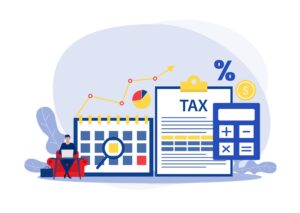Imagine your dream retirement: Waking up each day to relish the activities you love most, whether it’s nurturing a healthy lifestyle, cherishing moments with your grandchildren, exploring the world with your partner, or pursuing your passions. All this is possible without the constant worry of financial strains, given you have crafted a well-thought-out retirement strategy that encompasses planning for taxes in retirement.
Due to the excitement of designing their golden years, many people overlook a key factor—taxes. This oversight can have a significant impact if not addressed in a timely manner. Life may change completely in retirement, with shifting obligations and responsibilities, but taxes remain a constant.
Retirement brings a unique set of tax challenges. As a retiree, you’ll face various sources of income, including Social Security, withdrawals from IRAs and 401(k)s, and potentially investments. Understanding how these income sources affect your tax liability is essential. Failing to account for taxes in retirement may affect the overall success of your retirement plan.
Let’s delve further into understanding how retirement taxes in retirement work.

Understanding Retirement Taxes
As you transition from a working life to retirement, your income sources change, and so do the tax rules. This shift introduces a level of complexity that can be challenging to navigate. Retirement income can come from various sources, such as:
- Social security benefits
- 401(k) distributions
- Roth IRAs Accounts (Individual Retirement Accounts)
- Pensions
- Annuities
- Life insurance cash values
Each of these income streams has its unique tax implications. For example, 401(k) withdrawals are taxed as ordinary income, while Roth IRAs may provide tax-free distributions in specific circumstances. Annuities and certain bonds come with their own tax considerations.
Understanding these rules is vital to create a well-informed tax strategy that optimizes your income while potentially reducing tax liabilities in retirement.
Let’s break down how taxes might work based on the type of income you may have.
Social Security Benefits:
You may be required to pay taxes on a portion of your Social Security benefits, based on your income and filing status. The more you earn, the more of your benefits may be subject to taxation. For example, if you:
File as “individual” and your income falls between $25,000 and $34,000, you might be required to pay income tax on as much as 50% of benefits. If your income exceeds $34,000, up to 85% of your benefits could be subject to taxation.
File “joint” as a couple with a combined income between $32,000 and $44,000, you might need to pay income tax on up to 50% of benefits. If your combined income surpasses $44,000, up to 85% of your benefits may become taxable.
For married individuals who file separate tax returns, they will likely owe taxes on their benefits.
Tax-deferred Investments:
Certain investments accounts allow you to invest pre-tax dollars, ensuring neither your contribution nor the potential earnings are subject to taxation until withdrawal. Examples of these accounts include:
- 401(k) plans
- IRAs
- Annuities
With these accounts, you can defer taxes until you withdraw the money. This tax-deferral strategy can potentially reduce your annual tax liability.
Pensions:
Pensions are taxed in the year they are received, and the taxes owed decrease the amount available for spending. However, there are specific exceptions for military pensions and disability benefits.
Taxation on pensions can differ from state to state. As a result, some individuals choose to relocate to different states to minimize their tax obligations in retirement.
Benefits of Early Tax Planning
It’s important to recognize that a fulfilling retirement also includes having the freedom to do what brings you happiness.
Furthermore, having a carefully thought-out tax plan can alleviate some of the anxiety about your financial future. By taking a proactive approach, you can potentially minimize tax burdens and maximize your retirement income.
Tax-Efficient Investment Strategies
Effective retirement planning involves the utilization of various tools and strategies aimed at potentially reducing your tax liabilities during retirement. These methods require careful consideration and forward thinking to work optimally, ensuring that you can enjoy a more tax-efficient retirement.
Some tax-efficient investment strategies are:
Retirement accounts: IRAs and 401(k)s offer tax advantages by allowing pre-tax contributions or tax-deferred growth.
Municipal bonds: Provide tax-free interest income, particularly advantageous for those in higher tax brackets.
Index funds and ETFs: Passive investments with lower turnover, resulting in fewer taxable events.
Tax-managed mutual funds: Actively managed to minimize taxable distributions, reducing tax impact.
Qualified dividends and long-term capital gains: Taxed at lower rates, benefiting long-term investors.
Tax loss harvesting: Offsets gains with losses, managing tax liabilities within a portfolio.
Annuities and life insurance: Offer tax-deferred growth or tax-free benefits, but complexities and fees should be considered.
Consider your tax bracket and financial goals when choosing these options. Consulting with a professional can help tailor your strategy and asset allocation to align with your goals and retirement plan.

Tax Credits and Deductions for Retirees
As we’ve mentioned there are many strategies you could use to help lower your tax liabilities. Also, there are various tax credits and deductions available to retirees that can help reduce tax burden.
These are some of the available credits and deductions you could benefit you if you qualify:
Standard Deduction for Seniors: Retirees who are 65 or older can claim a higher standard deduction. The specific amount depends on your filing status and changes each year.
Business and Hobby Deductions: Some retirees start working as a consultant or start their own businesses as a hobby. If you’re running a business and are over the age of 65, you may qualify for additional deductions. These deductions can encompass various expenses, including but not limited to supplies, business costs, education, books, advertising, and more.
Medical and Dental Expenses: Retirees can deduct qualified medical and dental expenses that exceed 7.5% of their adjusted gross income. This could include health insurance premiums, doctor visits, prescription medications, and long-term care expenses.
State and Local Tax Deductions: Retirees who itemize deductions can often deduct state income taxes, local property taxes, and sales taxes paid throughout the year. This varies by state.
Charitable Contributions: Donations to qualified charitable organizations can be deducted, reducing taxable income. This includes cash donations and donations of goods or property.
Property Tax and Mortgage Interest: Retirees who own a home can deduct property taxes and mortgage interest if they itemize deductions on their tax return.
Elderly or Disabled Credit: Some retirees may qualify for the Elderly or Disabled Credit if they meet certain age and income requirements. This credit varies depending on filing status and income.
Understanding and taking advantage of these tax credits and deductions can significantly reduce the tax liabilities for retirees. It’s essential to stay informed about the eligibility criteria, as well as any changes in tax laws that might affect these benefits.
Estate Planning and Deductions
Your estate planning decisions can have a lasting impact on your heirs’ tax liability.
Depending on the size of your estate, federal and state inheritance or estate taxes may apply. Estate planning can help you minimize these tax burdens. Let’s explore some key strategies that can help protect your wealth:
Careful selection of beneficiaries may help reduce taxes. For example, a spouse can roll over the assets into their own retirement account, delaying required minimum distributions (RMDs). Non-spouse beneficiaries may need to take RMDs sooner, potentially increasing tax liability.
Gifting strategies, like annual gift tax exclusions and lifetime gift exemptions, can be used to transfer wealth to your heirs during your lifetime, reducing your estate’s taxable value. By reducing the taxable value of your estate through strategic gifting, you can effectively pass on more wealth to your heirs.
Donations to qualified charities not only benefits the causes you care about but can also provide valuable deductions that reduce your taxable estate. This philanthropic approach can positively impact your heirs by lowering the estate tax liability.
Establishing trusts is a common strategy in estate planning. There are different types, such as Irrevocable Life Insurance Trusts (ILITs), Qualified Personal Residence Trusts (QPRTs), and Charitable Remainder Trusts (CRTs). These trusts are like protective shields for your assets, helping to keep them from being heavily taxed.
Incorporating these estate planning and tax-saving strategies into your financial roadmap can make a substantial difference in preserving your wealth for your loved ones while minimizing the tax implications.
The Road Ahead
Retirement should be a time of relaxation, fulfillment, and freedom from financial worries. A well-thought-out retirement strategy that incorporates tax planning can make this dream a reality.
As you approach your golden years, don’t underestimate the significance of tax planning. With the right strategy, you can optimize your income, minimize tax liabilities, and enjoy the retirement you’ve always envisioned.
Don’t leave your retirement to chance; take control and make informed decisions to ensure a comfortable and worry-free retirement.
Finding the Right Help
Navigating the complexities of retirement taxes can be quite challenging and often demands years of careful planning and strategy. While it’s important to have a basic understanding to make informed decisions, you don’t have to tackle this alone.
Consider taking the next step toward a more secure retirement by seeking personalized guidance. Whether you choose to schedule a meeting with a financial professional or watch an educational webinar, these resources can provide you with valuable insights and a better understanding of how to optimize your retirement income while reducing your tax burden.
By exploring these options, you’ll be better equipped to make informed choices and ensure a financially stable and enjoyable retirement.
Gain valuable insight at a no-charge attend an educational seminar or webinar near you



Recent Comments